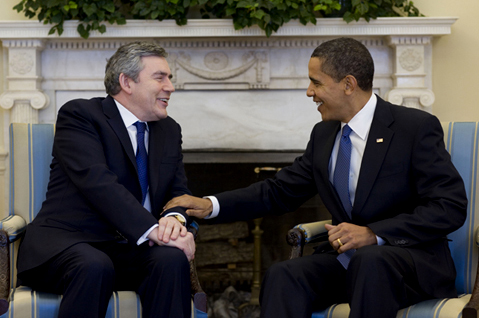Anyway, i'm up to April 2009 of Gordon Brown's premiership, a year from the 2010 General Election i thought i would share some thoughts about about his job thus far.
Reading what is a finely written book, a few things come across about Gordon Brown's strengths and weaknesses. His intelligence truly is remarkable, and i think it is often underestimated. Say what you like about the recession, i am in now doubt that Gordon Brown is a very clever man when it comes to Economics. Unfortunately, as Prime Minister, he had to go from a Chancellor, specialising in monetary policy, to an 'all-rounder' that is the role of PM. Indeed, his economic interests often clashed with those of his Chancellor, Alistair Darling. The two clashed far to often, disagreeing on policy far to often. The fact is the Prime Minister should have kept an eye on, but not got in the way of Darling. This was not the case, and as a result i think what were, i believe, sound economic decisions were made to seem rushed, muddled and even haphazard.
His commitment to international development is touching. Brown rather blew hot and cold when it came to oratory performances, however some of his most moving came when talking about foreign aid and global development. It is regrettable that his Premiership will forever be scarred with the wounds of a global economic crisis. Had the crisis not been on the scale it had been, or indeed not happened at all, i'm sure Brown's commitment to economic development would have been applauded for many years to come.
Indeed, during the G20 summit held in the UK in April 2009, while many leaders where ready to bash out deals regarding their own financial interests, Brown was insistent on not forgetting Less Economic Developed Countries during the crisis. Indeed, many considered Brown's chairmanship of the G20 summit to be one of his finest hours. His ability to converse with global leaders is something he was readily praised for. Brown's engaging personality earned him many friends on the global stage. Indeed, Brown's suggested most unlikely of all playmates, George W. Bush, was very complimentary about their relationship during their last conversation before Bush handed over to Barack Obama.
Even the illustrious Sarkozy, pomp and circumstance and all, got on well with Brown. While the two shared different ideals, they came together at a time or global economic need. However, while Brown's globetrotting was beneficial in building bridges, notably in the Far East and China, it is not global relationships that win General Elections. While on the international stage Brown was eloquent, charming and overall a leader, his domestic control always seemed to be lacking. The communique from the G20 summit was applauded as a success, safegaurding international development and economic security. However, domestic policy blunders such as the 10p tax debacle and extension of detention for suspected Terrorists, resulted in a generally unhappy cabinet and an unhappy electorate.
As a result, numerous plots against his leadership never painted a picture of a leader. There are only so many mutiny's a captain can stand before his credibility is all but wiped out. Damning press-releases, the most infamous perhaps by David Milliband in the Times in which he effectively announced his readiness to run for leadership at some point, did no good to Brown's effectiveness as a leader.
Some were keen on over-throwing Brown, which was not helped by the fact Brown had a tendency to alienate most of his cabinet, the majority of Junior Ministers and near enough all of the Parliamentary Labour Party. Brown took most of his advice from Ed Balls, Ed Milliband and the likes of Number 10 staff such as Jeremy Heywood, which left most other high-profile MPs in the lurch.
Altogether, Brown was always under intense pressure. Perhaps it was his personality; in general being quite difficult to work with and a bit of a perfectionist. Maybe it was always living in Blair's shadow got to him? With a botched General Election, which was expected in 2007, Brown never had a mandate, he never laid down a policy proposal in a manifesto that the public voted him in for. As a result, he never had a direction to pursue, policy was always a bit reactionary. His speeches at Party Conferences never pointed members in the direction he was going to take the Government - perhaps this is why domestic policy never got him any plaudits, and perhaps this, aside from global success and recovering an economic crises, resulted in failure to win the 2010 General election.



He was basically shat upon by crisis after crisis. Poor guy had, and has, my sympathy.
ReplyDelete"he had to go from a Chancellor, specialising in monetary policy, to an 'all-rounder' that is the role of PM."
ReplyDeleteGordon Brown was only skilled in monetary policy by his inaction on it, at the start of his term as chancellor he shifted almost complete control over the money supply to the Bank of England. Effectively ending British government control over monetary policy.
Where Brown shone was fiscally, resisting the temptation of seigniorage (printing money at the cost of increased inflation) in favour of taxation. While we can question policy on debt levels the UK wasn't geared worse than many other European countries. The only real blunder was selling the gold at a low price, but doing so represented an important as it was no longer necessary to hold it.
You have to watch the HBO show "Veep"
ReplyDelete